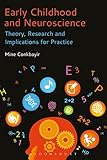Early childhood and neuroscience : theory, research and implications for practice / Mine Conkbayir.
Material type: TextPublisher: London : Bloomsbury, 2017Description: xix, 168 pages : illustrations ; 24 cmISBN: 978-1-4742-3190-9 Pbk, Bp.Subject(s): Early childhood education -- Philosophy | Cognitive neuroscience | Child development | EDUCATION / Preschool & Kindergarten | EDUCATION / Educational Psychology | SCIENCE / Life Sciences / NeuroscienceLOC classification: LB 1139.23 C66 2017 CTE
TextPublisher: London : Bloomsbury, 2017Description: xix, 168 pages : illustrations ; 24 cmISBN: 978-1-4742-3190-9 Pbk, Bp.Subject(s): Early childhood education -- Philosophy | Cognitive neuroscience | Child development | EDUCATION / Preschool & Kindergarten | EDUCATION / Educational Psychology | SCIENCE / Life Sciences / NeuroscienceLOC classification: LB 1139.23 C66 2017 CTE| Item type | Home library | Call number | Status | Notes | Date due | Barcode |
|---|---|---|---|---|---|---|
|
|
MMSU Laoag Campus Library | LB 1139.23 C66 2017 CTE (Browse shelf(Opens below)) | Available | For Circulation | 34901 |
Includes bibliographical references and index.
Machine generated contents note: -- Foreword, Colwyn Trevarthen, Emeritus Professor, University of Edinburgh, UK -- Introduction: What To Expect and What Not To Expect From This Book -- 1. Neuroscience: What Is it? -- 2. Why Should Early Childhood Practitioners Know About Neuroscience? -- 3. Emotional Well-being: How Can We Help to Build Healthy Brains? -- 4. Children's Language and Communication Development: What Can Neuroscience Tell Us? -- 5. Beyond Nature Versus Nurture: Is Neuroscience Relevant to the Debate? -- 6. Conclusions and Recommendations: Where Do We Go From Here? -- Glossary of Terms -- Bibliography -- Index.
" Early Childhood and Neuroscience is a practical guide to understanding the complex and challenging subject of neuroscience and its use (and misapplication) in early childhood policy and practice. The author begins by introducing the definition and history of neuroscience. The reader is then led through structured chapters discussing questions such as: Why should practitioners know about neuroscience? How can neuroscience help practitioners better provide for babies and children? and Is it relevant? Topics covered include the nature vs. nurture debate through the lens of neuroscience, epigenetics, the first 1001 days and a discussion on just how critical the first three years of life are to healthy brain development. The book provides a balanced overview of the debates by weaving discussion on the opportunities of using neuroscience in early childhood practice with examination of the limitations and ethical implications throughout the chapters. This enables students to inform their own opinions about the discipline and its use in their future practice. Clear explanations of the main terms and theories are complemented with illustrative case studies of cutting-edge research from around the world, a glossary of key terms and suggestions for further reading. Reflective discussion questions give students the chance to apply their theoretical knowledge to real-world contexts. These features encourage and support independent critical thinking, helping students to reflect on, evaluate and analyse a range of ideas, research findings and applications for their own future early childhood practice. Early Childhood and Neuroscience is essential reading for lecturers, undergraduate and postgraduate students in the field as well as for the new practitioner. "-- Provided by publisher.
"A balanced introduction that bridges the gap between current neuroscience research and early childhood practice"-- Provided by publisher.

There are no comments on this title.